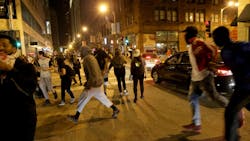FBI, DOJ Probing St. Louis Police Conduct During Protests
By By Robert Patrick
Source St. Louis Post-Dispatch
ST. LOUIS — The FBI and federal prosecutors are investigating police conduct during protests after September’s acquittal of the St. Louis officer for a fatal 2011 shooting.
The investigation centers on “allegations of potential civil rights violations by law enforcement officers in the St. Louis area on Sept. 15, 2017, and in the weeks that followed,” said Jeffrey B. Jensen, U.S. attorney for the Eastern District of Missouri.
“The FBI will collect all available facts and evidence and ensure that the investigation is conducted in a fair, thorough and impartial manner. As this is an ongoing investigation, we are not able to comment further at this time,” he said.
He also declined to comment on what specifically prompted the investigation.
The move follows at least three calls for an investigation into police behavior during the protests after the acquittal of former St. Louis police Officer Jason Stockley, and a federal judge’s preliminary ruling last week that restricted police use of chemical agents and dispersal orders.
In an unusual move for that stage of the case, U.S. District Judge Catherine Perry ordered the police and the ACLU to mediation after issuing her preliminary ruling.
Tony Rothert, legal director of the ACLU, which is handling the lawsuit that prompted Perry’s order, said in a statement Monday that “while it is important that the federal government investigates the systemic violation of civil rights by the St. Louis Metropolitan Police Department, the city of St. Louis should proactively engage with the community now to develop a collaborative policing model that protects constitutional rights and promotes public safety.”
In a statement, St. Louis Mayor Lyda Krewson said, “Chief (Lawrence) O’Toole and I believe that an independent, third-party review makes sense” and they were pleased with the news from the U.S. attorney.
The mayor’s office declined to comment on questions about when the investigation began and what prompted it, but said it and police would cooperate.
In media interviews, O’Toole has defended police and said dozens of officers have been injured during protests.
Acting U.S. Attorney Carrie Costantin responded to Krewson and O’Toole in an Oct. 4 letter that the Justice Department’s Civil Rights Division would be the agency to handle an investigation into whether there was a police “pattern or practice” of depriving people of their constitutional rights. The local U.S. Attorney’s office would investigate if there were “specific, credible evidence alleging a deprivation of rights by a law enforcement officer,” her letter says.
A Justice Department “pattern and practice” investigation into Ferguson police after the death of Michael Brown led to a highly critical 2015 report, but the department also said earlier this year that it was moving away from those types of investigations.
Jensen was sworn in two days after Costantin’s letter.
Sherrilyn Ifill, president of the NAACP Legal Defense and Education Fund, asked Jensen for an investigation late last month, and Rep. William Lacy Clay, D-Mo., asked for one after Perry’s ruling.
Clay, who represents St. Louis, called the city “the poster child for the need of federal intervention to address decades of bad police relations that reinforce the decline and erode the trust of police-community relations.”
On Monday, Clay said in a statement that he was “very gratified” that Jensen and the Justice Department “responded so quickly.”
Perry’s order limits certain conduct of St. Louis police during protests, including some of the activities that generated the most complaints. It says police can’t declare an “unlawful assembly” against those “engaged in expressive activity, unless the persons are acting in concert to pose an imminent threat to use force or violence or to violate a criminal law with force or violence.”
Police can’t use pepper spray or a dispersal order to punish protesters, she wrote. They can’t use chemical agents against protesters without probable cause to make an arrest and without providing “clear and unambiguous warnings” and an opportunity to heed those warnings.
And they cannot order protesters to disperse without giving them specifics about where to go, how long to stay away and the consequences for ignoring the order.
In three days of testimony in U.S. District Court last month, protesters and others said that they were beaten and pepper-sprayed by police. Some were caught up in a controversial Sept. 17 police “kettle” and mass arrest.
Police witnesses denied those claims.
Jensen’s statements were first reported by the St. Louis American.
———
©2017 St. Louis Post-Dispatch
Visit the St. Louis Post-Dispatch at www.stltoday.com
Distributed by Tribune Content Agency, LLC.



